Viktor Orbán is My Hero
The Hungarian Prime Minister is at the vanguard of a new European orientation away from EU authoritarianism and towards national sovereignty.
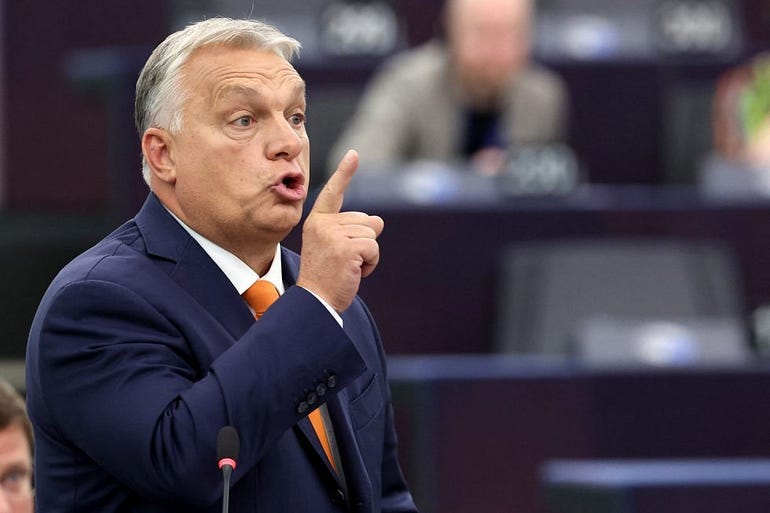
Things are starting to get interesting in Europe. In July, Hungary took over the rotating Presidency of the Council of the European Union, which is the supreme legislative body of the EU. It is a council made up of the 27 heads of state of the EU member countries. It is the Council that elects (selects) the members of the European Commission (EC).
Prior to the Treaty of Lisbon, the Council was also the supreme Executive body of the EU. The Lisbon Treaty transferred the executive power of the EU to the newly created European Commission and something that is (confusingly) called the European Council.
The Council of the EU is sort of a legislative upper house, but it’s like a US Senate on steroids because of its broad powers to choose who sits in the bloc’s executive branch (i.e., the European Commission).
Orbán’s Presidency, however, was bound to cause friction, as Hungary is on the outs with Brussels because of their laws against foreign agents interference, their ban on gay marriage, etc. as well as their “friendliness” towards Russia. perhaps most of all , Hungary is a pariah because of Orbán’s opposition to giving more aid and money to Ukraine in order to fight Russia.
Hungary versus the European Union
In addition, Orbán ruffled feathers when, upon his assumption of office, he immediately embarked on a round of shuttle diplomacy, a “peace initiative” in which he met with Putin, Xi, and Trump to discuss ending the war in Ukraine. This aroused the ire of Ursula von der Leyen and most of the EU in general, as the “official policy” of the EU had been to avoid speaking or communicating with Putin about anything whatsoever. This led to more accusations of being “Russian-friendly” hurled at Orbán.
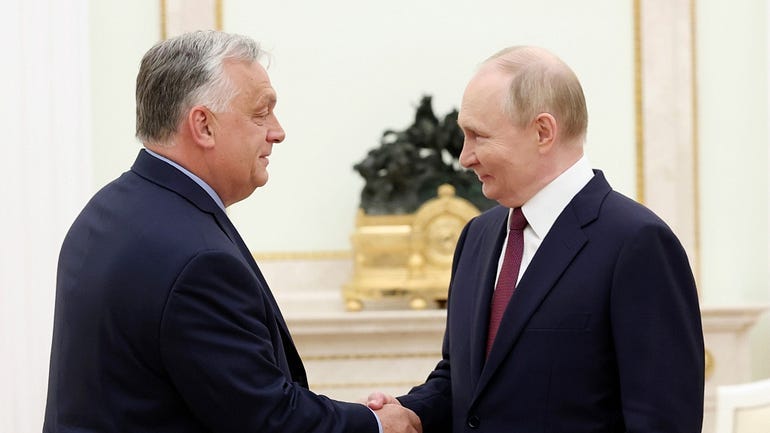
Consequently, there is a sort of constitutional crisis developing in the EU at the moment. Of course, the EU does not have an actual “constitution”, having failed to ratify one in 2007 due to the recalcitrance of the French and the Dutch. But there is a massive and personally vitriolic feud heating up in Brussels. It is pitting the President of the EC (Ursula von der Leyen) against Viktor Orbán, the Hungarian PM and President of the Council of Europe.
The EC under neocon von der Leyen’s direction is trying to find ways of circumventing Hungary’s veto over increased aid to Ukraine. Hungary (along with Poland) also opposes Ukraine’s entry into the EU. As punishment for their defiance, the Commission is withholding about €30 billion in EU funds, grants and loans from Hungary, and €36 billion from Poland.
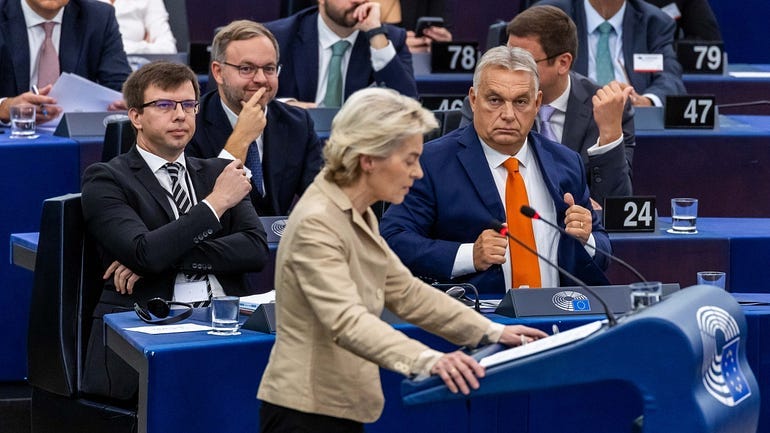
It is this kind of Gestapo spank that has prompted Orbán to declare: “From our perspective the EU is a benign dictatorship at best, not a democracy”.
My social feed has been flooded with clips of the speeches delivered this month in Brussels — highlighted by duelling tirades from VDL and Orbán. I must say that in these exchanges, the Hungarian PM comes out looking the strongest, the most formidable with facts to back up his arguments. Von der Leyen, OTOH, appears to be flailing and is — as is her custom — colouring her rhetoric with obvious and easily provable falsehoods and lies.
It really is a “get out your popcorn” moment for a body that is normally so boring, staid and irrelevant that we all mostly ignore it. But now everyone wants to see what one Italian paper called the “Orbán show”. In it, Orbán took on the (unelected) President of the European Commission, Frau Ursula von der Leyen, saying:
“She has made the Commission a weapon of progressives“.
Orbán versus von der Leyen
There is indeed a battle royale shaping up between Ursula von der Leyen and Viktor Orbán. This conflict promises to be an interesting one, as it pits an independent, hard-bitten European political veteran against a pre-programmed puppet of the transatlanticist cabal that runs the American Empire.
A political split
Once upon a time, both Orbán’s Fidesz Party and von der Leyen’s CDU were part of the “europarty” called the European People’s Party (EPP) — a centre-right group that holds the most nuber of seats in the European Parliament.
As the EPP started to adopt more transatlantic policies, enforcing harsh “top-down” uniformity on the European Union, the Hungarians and others became restless and resistant.
Things reached a head in December 2020, when the EPP suspended the head of the Fidesz delegation, Tamas Deutsch, after he compared EPP head Manfred Weber to the Nazis’ secret police force, the Gestapo — foreshadowing his boss’s “benign dictatorship” remarks four years later.
Such a comparison no doubt enraged Ursula von der Leyen.
It is a cold, hard fact of life that not every blonde-haired, blue-eyed Aryan is sharp-witted, intelligent, pragmatic, and a natural leader. In fact, many blonde-haired, blue-eyed Aryans are simply dullards; empty vessels who have no real thoughts of their own, but only parrot what they have been told to say by their various handlers.
Many EU leaders are such pliable vassals, and I wrote about them in my article, “NATO is a Farce, Part 2: The Puppet Parade”.
Ursula von der Leyen is a perfect example. A descendant of German nobility by both birth and marriage, she is a product of years of grooming, all aimed at making her a perfect European vassal in thrall to her masters in the United States. It started with her education in the London School of Economics, an institution which, together with Yale University and other US counterparts, forms a tethered system by which the transatlanticist leaders of tomorrow are indoctrinated.
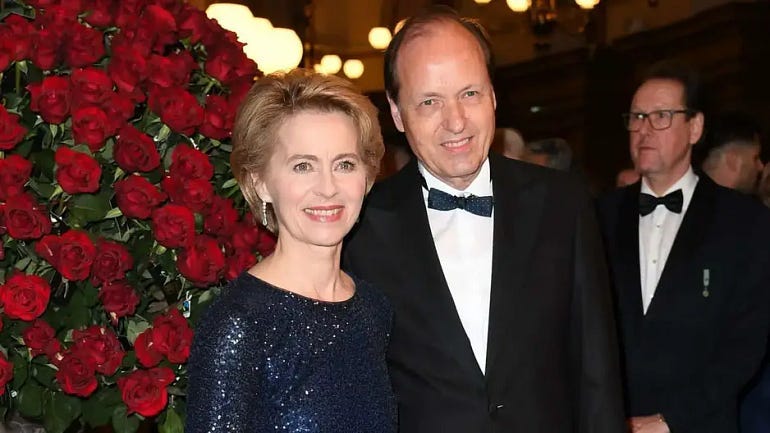
Von der Leyen’s bio in Wikipedia states cryptically that: “After marrying fellow physician Heiko von der Leyen, she lived for four years in the United States with her family in the 1990s”. We have no idea what she was doing there during that time. We can only glean from Brittanica that she lived in the US from 1992 to 1996 (during the first Clinton Presidency) and then returned home to Germany to become “involved in 1996 in the politics of Lower Saxony — the federal state her father had governed”.
Orbán the street fighter
Unlike Ursula von der Leyen, who was born with a political silver spoon in her mouth, Viktor Orbán came of age under the old Soviet Union, and first made a name for himself as a founder in 1988 of the Alliance of Young Democrats (Fiatal Demokraták Szövetsége, FIDESZ), the group that later came to form his political party.
In June 1989, Orbán made a name for himself by giving a fiery speech rejecting the Soviet model, calling for free elections and the withdrawal of Soviet troops from Hungary. Orbán was rewarded for his Western-leaning enthusiasm by none other than George Soros, whose Foundation funded Orbán’s research fellowship at Pembroke College, Oxford (UK).
The young, “liberal” Orbán returned to Hungary in 1990 to join the first post-Soviet Parliament as a representative of Fidesz. He soon became the Party’s President in 1993, and Viktor Orbán has been the face of Fidesz ever since.
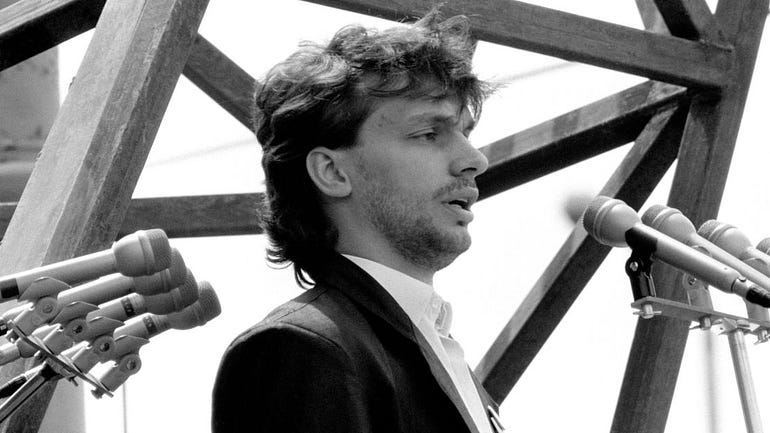
Orbán’s move from Left to Right
Viktor Orbán was not always the anti-atlanticist nationalist he is today. In fact, from April 1996, Orbán was the highly praised chairman of the Hungarian National Committee of the New Atlantic Initiative (NAI), a transatlantic organisation sponsored by the American Enterprise Institute, a Washington-based conservative think tank.
Orbán started out as a dutiful Soros acolyte (and part-time employee), working within the liberal Fidesz organisation to promote “the concept civil society in European political thought”. Orbán even studied under Polish liberal and civil society guru Zbigniew Pełczyński, who was Bill Clinton’s tutor.
As time went on, however, both Orbán and Fidesz moved away from “Clintonite” liberal, transatlanticist, globalist notions of “civil society” and more towards a nationalistic return to traditional values and state sovereignty in an increasingly globalised world.
A flip on George Soros
Under Orbán’s leadership, Hungary has made George Soros, the Soros family and the Soros Open Society Foundations persona non grata in Hungary.
In 2018, Hungary passed what the government dubbed the “Stop Soros” law drafted by Orbán himself, which made it a crime to “promote and support illegal migration”. The law was immediately attacked by ” the Hungarian Helsinki Committee, a local chapter of the transatlanticist Helsinki Commission, a US organisation designed to promote American policy in Europe.
More recently, in 2024, Orbán’s government launched a targeted campaign associating the Soros family with the European Commission and Ursula von der Leyen personally.
As the Associated Press (AP) reports:
“Hungarian Prime Minister Viktor Orbán has long taken an adversarial approach to the 27-nation bloc. He has accused Brussels of seeking to impose unwanted policies on Hungary, and compared membership in the EU to the 40 years of Soviet domination Hungary experienced in the 20th century.”
In other words, the “benign dictatorship” that Orbán mentioned in Strasburg.
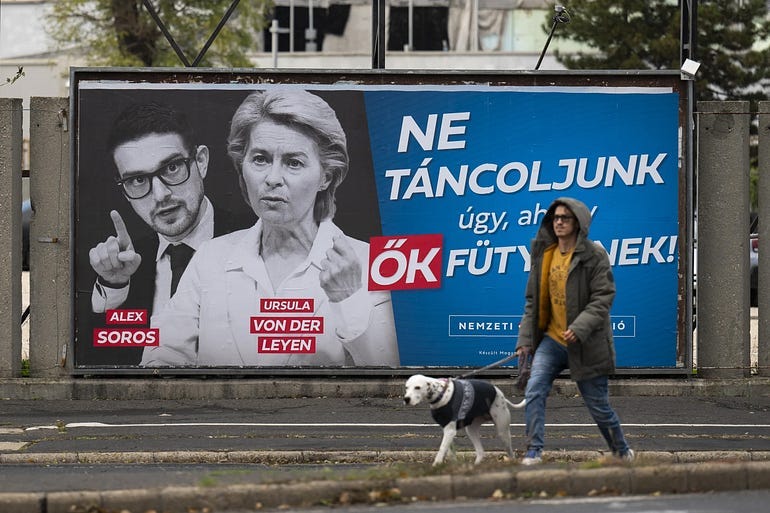
The 180 degree turn that Orbán has taken vis-à-vis Soros, his former benefactor, is emblematic of the current trend in Europe. As POLITICO describes:
“The elder Soros, who in many ways is Orbán’s political godfather, is now a sworn enemy — and their running political dispute mirrors and to a degree defines the ideological divide between liberalism and nationalism that’s shaping Europe’s present and future.”
I believe it is because Soros has and his various NGOs have — along with the CIA — played such central roles in the “colour revolutions” that have plagued former Soviet satellite countries. These “astro-turfed” rebellions are all aimed at the same goal: to break a country’s cultural, financial, economic and military ties with Russia and pull them into ther cultural, economic and military spheres of the West (via the EU and NATO).
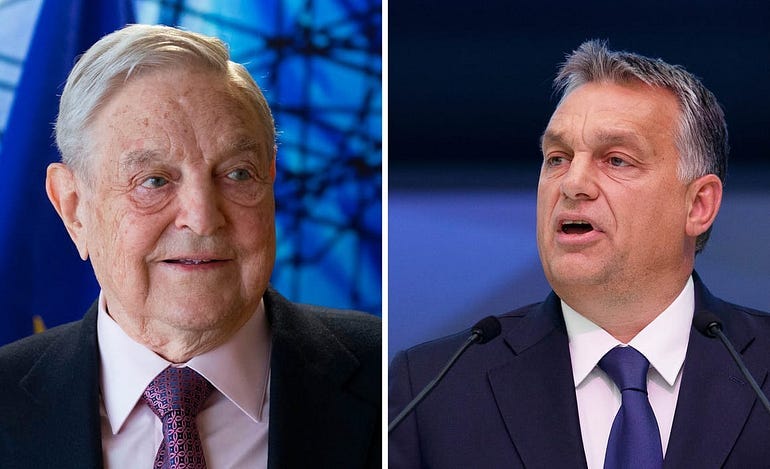
Orbán’s problem with Soros is born, then, of his desire to maintain good relations with Eurasia (Russia and China) and to resist the militarism and cultural fascism of the collective West.
“Soros’s aim, according to Orbán, is to undermine the soul of European Christian society — to hollow out the West from the inside out…Once Soros and his allies succeed in opening the borders, Orbán warns, Muslim refugees will flood into Hungary and the rest of Europe — and soon the continent will become unrecognisable.”
Defending sovereignty with a Hungarian FARA
In addition, there are several instances where election interference by Soros and the US Government have been documented.
To counter the influence of Soros and the CIA/NED/USAID and other foreign (Western) entities, Hungary passed the “Sovereignty Protection Act” that sanctions — and can even impose jail terms — for groups that accept foreign funds for political causes.
This act is like the American FARA (Foreign Agent Registration Act), which seeks to prevent undue influence from foreign entities in American public life, media and politics. One difference between the two laws: the FARA provides for prison terms for up to five years, the Hungarian law for only three.
Needless to say, the EU is seeking to punish Hungary for this law, just as they want to punish Georgia for seeking to keep the CIA out of their elections.
The Valkyrie von der Leyen
The cultural and political authoritarianism and hyper-militarism that characterises today’s European Union are embodied in the strident harpie that is Ursula von der Leyen.
As I describe in my article, “NATO is a Farce, Part 7: Europe’s New Authoritarianism”, von der Leyen leads a project to turn the European Union away from its charter as an economic cooperative and into a sociopolitical superstate, a sort of “United States of Europe”, complete with its own military, its own taxation system, and its own supreme, all-powerful Executive, led by von der Leyen herself.
Von der Leyen cut her teeth as Germany’s first female defence minister. She brought her transatlanticist, globalist orientation to that role, becoming what one British defence minister called “the doyenne of NATO ministers for over five years". But while she was making friends in the EU level, she was rocked by scandal back in Germany, where she is accused of corruption in handing out millions in defence contracts to pay over-priced consultants from US firms Accenture and McKinsey.
Despite her corruption problems, von der Leyen carved out a niche for herself in the NATO firmament, and had she not failed upwards into her current role as EC President, she almost certainly would have become NATO Secretary General.
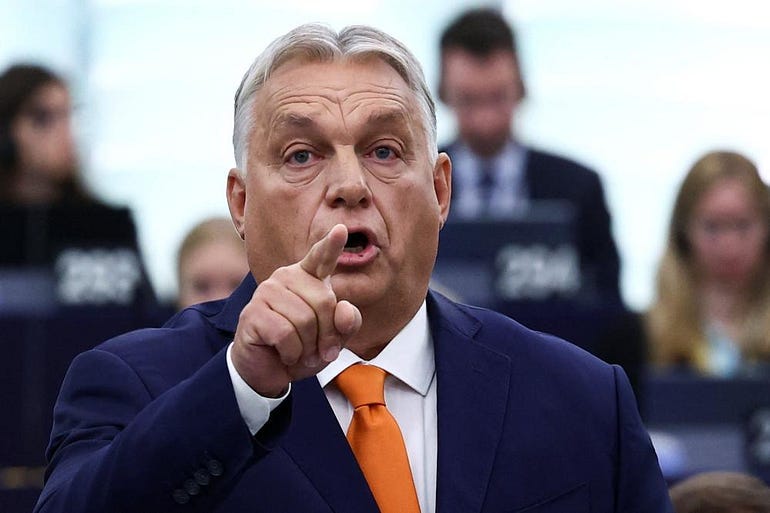
At odds over Ukraine
In her speech on October 9 to the European Parliament in Strasburg, Ursula von der Leyen laid out in stark terms her vision of how to handle Ukraine — namely, more of the same failed strategy:
“There is only one way to achieve a just peace (…) : we must continue to strengthen Ukraine’s resistance with political, financial, and military support”.
When it was his term to speak, Orbán responded forcefully, admitting — as no other EU leader will — that Ukraine is losing the war:
“We are losing on the Ukrainian frontlines, and you are all acting as if this isn’t happening.”
Later, he told reporters:
“We just want to convince European leaders to change their strategy [regarding Ukraine] because the current strategy does not work…If you cannot win on the battlefield — you have to communicate, you have to negotiate, you have to have a cease-fire.”
The Showdown in Strasburg
The battle between Ursula Von der Leyen and Viktor Orbán reached a head at a plenary session of the European Parliament in Strasburg, France, on October 9, 2024.
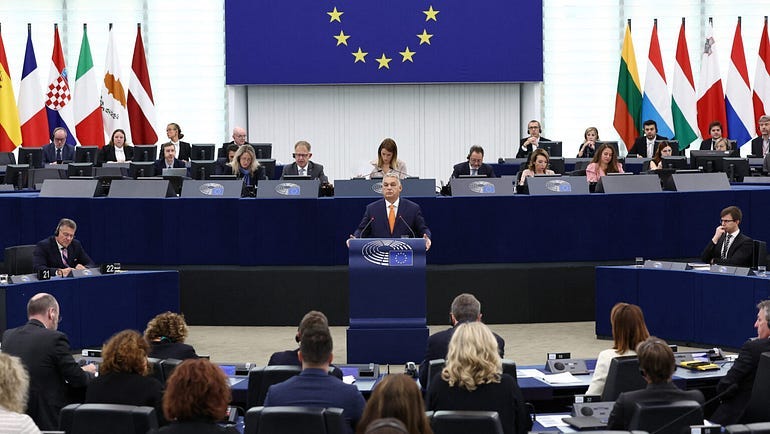
To highlight Hungary’s assumption of the Presidency of the Council of the European Union, Orbán delivered a prepared speech detailing the proposals and priorities of the Hungarian Presidency for the remaining months of its Presidency. It was his intention to kick off a round of negotiations and discussions to help implement “change”:
“I have come here to sound the alarm. I am following the example of President Draghi and President Macron: the European Union must change, and this is what I want to convince you of today.”
Part of this change, Orbán said Member States “expect swift and decisive action from the European institutions”. He then read off a litany of examples where the EU institutions under von der Leyen’s control needed to improve:
“Member States expect a reduction in administrative burdens. We expect a reduction in over-regulation. We expect affordable energy [a swipe at the sanctions and the Nord Stream debacle].
“We expect a green industrial policy. We expect the internal market to be strengthened. We expect the Capital Markets Union. And Member States expect broader trade policy: trade policy that, instead of the formation of blocs, increases connectivity.”
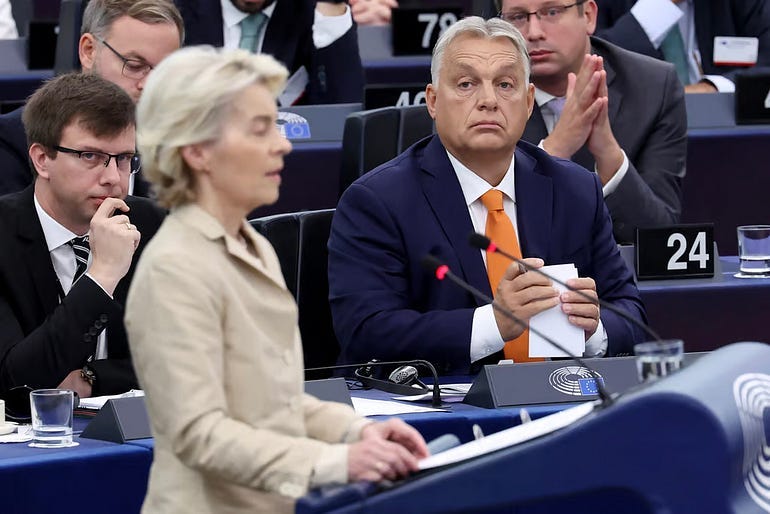
The last remark was a pointed criticism of the anti-Russian “boomerang” sanctions that Hungary opposes.
Von der Leyen used her response time, however, not to address the issues raised by Orbán, but to attack the Hungarian Prime Minister on a wide array of topics, ranging from “rule of law” legislation, to Ukraine funding, to his “friendliness’ with Russia.
Such acrid and at times personal attacks are highly out of order and certainly strange, coming from a EC President whose job is to manage the administration of the EU rules, not to act as the sole arbiter of them.
Europe’s culture wars
The battle between von der Leyen and Orbán is more than just symbolic of the conflict between Hungary and the EU; it is emblematic of a greater struggle, one that seeks to define the very soul of the European Union.
This conflict is epic in its proportions and its consequences, as it pits the defenders of European culture, history and tradition against the new forces of globalism, transatlanticism and “wokism”.
European history versus globalisation
I am old enough to have gone to school when the subject of “Western Civilisation” was the cornerstone for every American history curriculum. While this may be changing in the United States — and rightly so — it is still something that most traditional Europeans hold dear. Everything from the Greek origins of democracy to the promise of the Enlightenment stemmed from that culture that we call “European”.
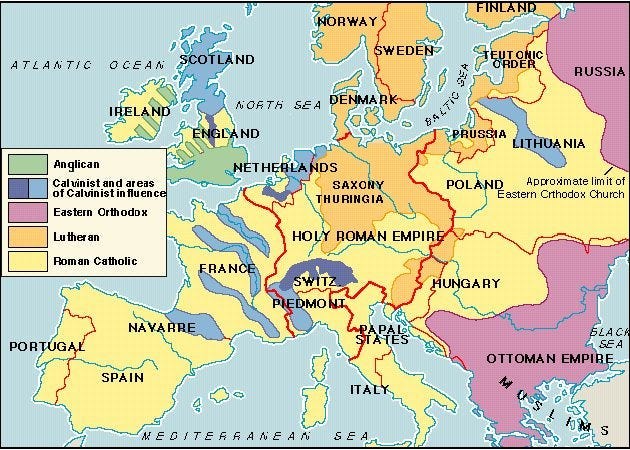
Protecting a “Christian Continent”
And yet that shared history also carries with it a history of Christianity. One reason that EU members such as France and Germany have so stalwartly opposed the entrance of Turkey into the EU is the fact that introducing 90 million Muslims into the Union would “dilute” Europe’s “Christian character” — a character that evolved over centuries:
“There is considerable evidence to suggest that the basic value orientations and institutional structures were in place before the collapse of a unitary Christian worldview once known as Christendom. While the general move to modernity from the seventeenth century onwards resulted in the gradual erosion of medieval Christianity, what remained was a civilisational framework that proved to be highly resilient.”
The Continent’s inherently Christian character is vouchsafed by the fact that in most European countries, the political landscape is usually dominated by a party that is some flavour of “Christian Democrats”.
Yet, this Christian “civilisational framework” is being rapidly eroded in Europe today, to the point where The Observatory on Intolerance and Discrimination against Christians in Europe (OIDAC Europe) found that “Europe has witnessed a 44% jump in anti-Christian hate crimes across more than two dozen European countries over the past year”.
OIDAC also found for 2022 that “France has the highest number of hate crimes against Christians — who remain the country’s most targeted religious community — followed by Germany, Italy and Poland.”
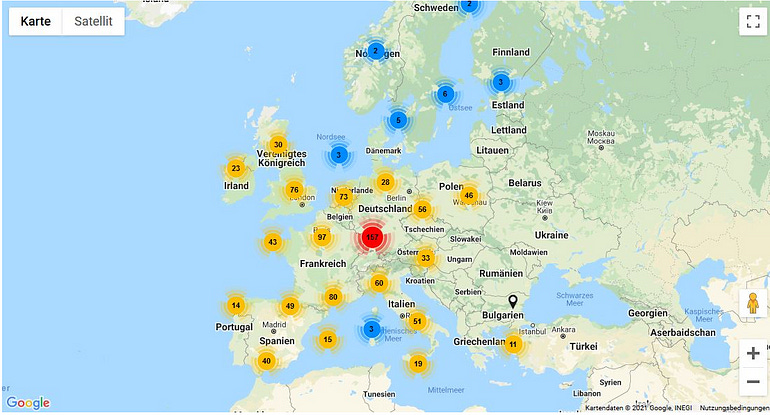
From the OIDAC Annual Report:
“In the case of anti-Christian hate crimes, our research shows that one of the main sources of aggression are radicalised members of extreme political groups, with a majority of cases coming from far-left political groups, such as Antifa, radical feminists, or LGBTIQ groups.
“Furthermore, we have documented attacks by radical individuals from…radical Islamist groups.”
Moreover, the president of OIDAC declared that “the general prejudice against religious commitment among the European elites is responsible for a large part of the growing intolerance and social hostility of which Christians are subjected”.
The European Union is run by just such elites.
These secular, globalist elites are, however, opposed by EU member states such as Hungary, Slovakia and Poland, which are emblematic of what has been called “Christian Democratic transnationalism” in the countries of East-Central Europe.
These countries are promoting “Christian values” while downplaying or suppressing or even outlawing some activities of the LGBTIQ+ communities.
The EU autocrats in Brussels are seeking to deny these countries the right to structure their civil societies in the way that best suits their citizens.
Hungary defends “Christian values” as “European values”
Orbán and his government have positioned themselves strongly as the defenders of European Christian values.
Indeed, to kick off their EU Presidency, Hungary organised a “Mass for Europe” at the Roman Catholic Cathedral in Brussels.
In addition, Budapest hosted a conference, entitled “Shared Responsibility: Cooperation Between States and Religious Communities in Europe,” which was billed as “a gathering of politicians, religious leaders, and experts from all over the world.”
The purpose of the conference, according to the organisers, was to highlight “the dangers of embracing neo-Marxism and pro-migration policies for Europe’s future”.
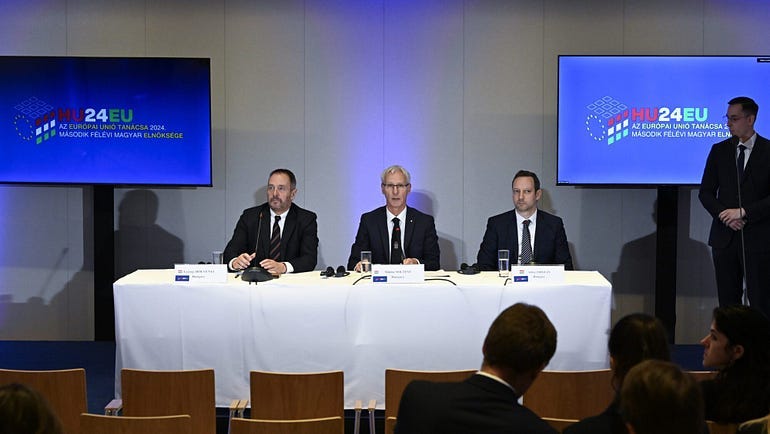
“States’ Rights” in the European context
The battle taking shape in Europe is one that is familiar to Americans. It is a classic clash between those who value “states’ rights” above all against those who are pushing for a strong Federal authority to enforce common standards and laws across all states.
It is no secret that Ursula von der Leyen is an EU Federalist. one who seeks to create a “United States of Europe” complete with its own taxing authority and military industrial complex. I wrote about this in my article, “NATO is a Farce, Part 8: Europe Builds Its Own “Military Industrial Complex”.”
“United in Diversity”
Viktor Orbán — and many other EU leaders — see it differently. They are wary of concentrating too much power in Brussels. They value the official EU Motto: “United in diversity”, which emphasises and celebrates the diverse nature of the Union member states.
Wikipedia describes the purpose behind the motto:
“The motto means that, via the EU, Europeans are united in working together for peace and prosperity, and that the many different cultures, traditions and languages in Europe are a positive asset for the continent. This amounts to the embracement of multiculturalism as the goal of European integration, as opposed to the goal of an emerging European identity which had been advocated in the 1990s.”
In his fight with von der Leyen in Strasburg, Orbán emphasised several times that Europe was to be found in the member states, and not in the elites in the institutions, referencing repeatedly the “Unity in Diversity” motto of the bloc:
“Europe is not in Brussels, not in Strasbourg,” he said. “Europe is in Rome, Berlin, Prague, Budapest, Vienna, Paris. It is an alliance of nation states.”
He later told reporters:
“The elites are putting a protective ring about themselves, but we live in a democracy, and these voices have to have found people to represent it.”
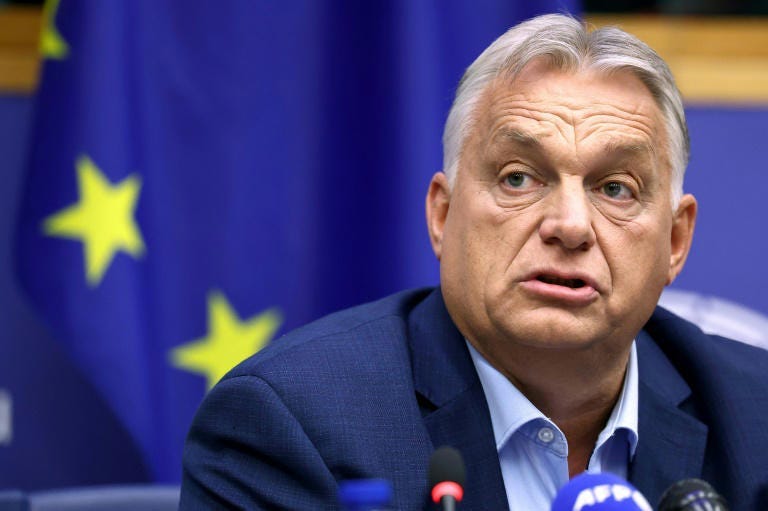
Von der Leyen: the enemy of diversity
For many years now, Ursula von der Leyen has been unabashed in her Federalist views:
“My aim is the United States of Europe — modelled on federal states like Switzerland, Germany or the U.S.,” she told Der Spiegel in 2011. She repeated her call for a federal EU in an interview with Die Zeit in 2016, adding: “I imagine the Europe of my children or grandchildren not as a loose union of states trapped by national interests.”
This view — that of a “United States of Europe” — is supremely radical. It would require a homogenisation of Europe, creating a “melting pot” such as the United States, a cauldron in which all the various nationalities of the EU are boiled until all the differences are evaporated or melted away as dross.
It is no wonder, then, that such an idea is most popular in Germany and France — the two largest members of the EU.
No wonder either that the leaders of those two states are the most ardent opponents of Viktor Orbán and the others pushing to defend their countries’ sovereignty.
Here we also see a similarity with the US: the “flyover” states in the center and south are opposed to the domination of the country by “coastal elites” in New York and California.
One must assume that under von der Leyen’s Federal Europe scenario, there would have to be one common currency, and possibly also one common language. As in the United States, it could be that a Federal Europe allows for different languages in terms of official documents. but that one language (probably English) would be the de facto “lingua franca” for commerce, media and social interactions.
In any case, regardless of the extent of the actual homogenisation, such a Federal superstate would certainly be in direct contradiction to the EU motto of “United in Diversity”.
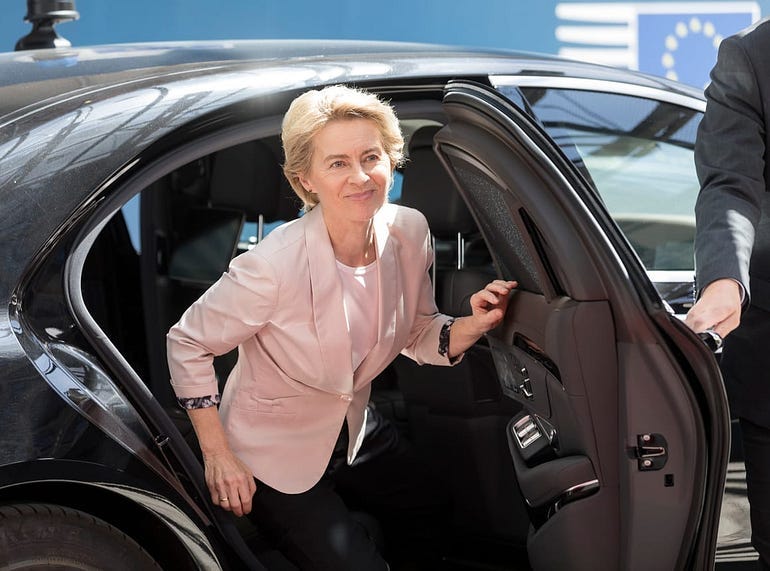
Von der Leyen is the leader of the effort to make Europe a “woke” superstate in which globalism reigns supreme, and each member state must submit to the “norms and values” dictated by Brussels.
And while von der Leyen has throttled back her pronouncements for a Federal Europe, her focus on an EU military industrial complex — and the EU-wide bond structure to support it — reveal the long term plan for a federalised superstate with its own taxing authority.
Again, this struggle, and VDL’s goals, will seem all too familiar to Americans. We have, after all, seen this battle raging in our own country for many years. In fact, the EU and the USA already share many similar “battlefronts” in the fight against the agenda of the global elite.
Vaguely defined “norms” and “values”
Just as Donald Trump is criticised and condemned for going against “norms”, so is Viktor Orbán attacked for violating what the von der Leyen forces call “European values” and “rule of law”.
Both these elements are poorly defined and only serve to justify the imposition of the globalist agenda. One is prompted to ask how a European country can violate “European values” at all — if the EU truly values “Unity in Diversity” then surely, whatever that European country decides to do must reflect “European values”.
It is a “one size fits all” approach in which only a cabal of elites get to decide what that size is.
That said, it is obvious that the VDL coalition does not consider Christianity to be a European value. Nor do they consider all that Christianity implies, such as the definition of marriage as being between a man and a woman.
As a minister in Germany, Ursula von der Leyen was an early and enthusiastic supporter of gay marriage. Hungary, however, has a constitution that forbids gay marriage (none of the former Soviet states allow gay marriage).

East versus West: internal divisions over marriage
Like most of the Eastern European members of the EU, Hungary allows gay partners to have formally recognised “civil union” partnerships that afford them the same legal rights and protections as married couples.
But that’s not good enough for the globalists in Brussels. The European Commission is hauling Hungary into the European Court of Justice (ECJ) for its “gay propaganda” law prohibiting exposing children to gay content and materials in schools and other public venues.
Other Eastern European states such as Poland are also being sued over laws that restrict LGBTQI+ “rights” — again inviting comparisons with the United States:
“Like Florida and Texas, Poland and Hungary have passed laws banning schools from indoctrinating young children on gender ideology and sexual orientation.”
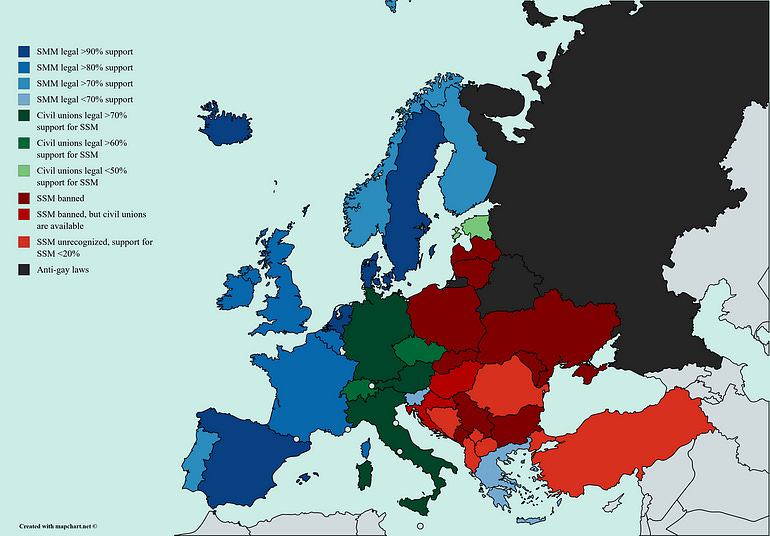
Battles over migrant rights
One of the more well-known and long-running feuds between Budapest and Brussels has to do with Hungary’s steadfast opposition to Muslim migration.
In 2015, when the US “dirty wars” in Syria sent millions of Muslim refugees streaming towards Europe, Germany’s Angela Merkel welcomed them with open arms. Germany had, since the end of WWII, relied on Muslim (mostly Turkish) manpower to operate the massive assembly lines of Daimler, VW, BMW, Bosch and Krupp. So this was good for Germany.
For Hungary, however, the migrant crisis was a nightmare. Hungary has a 700 year history of serving as Europe’s eastern-most bastion against the invasions of the Eastern hordes — whether Genghis Khan’s Mongols or the Muslims of the Ottoman Empire.
In short, keeping foreigners OUT of Europe has been a national mission of Hungary since the 1200’s.
When the migrant crisis happened in 2015, Hungary quickly became overrun. This prompted a natural backlash that lead to a hardening of the border and restrictions on entrance into Hungary.
Hungary had been invaded and conquered by Muslims from the East several tiems during the Hungarian-Ottoman Wars. It is easy to imagine how this fear of Muslim invasion is ensconced in the country’s collective historical memory.
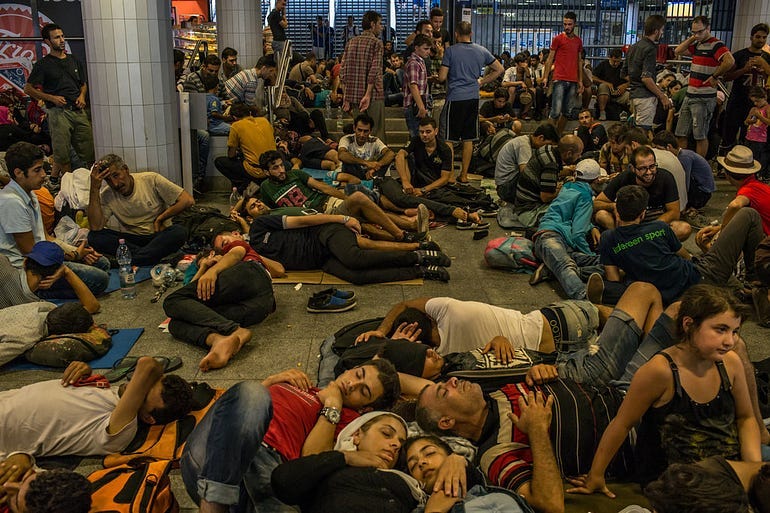
The European Commission has taken Hungary to the ECJ over its restrictive migrant policy, which was hardened during the COVID pandemic, and which continues to be restrictive today.
Hungary has been criticised for its decision to erect a fence on their southern borders to keep out illegal migrants But when Orbán addressed the EU Parliament in October, claimed that every European leader will come to the same conclusion that he has — namely that protecting the external borders of the EU and establishing hotspots outside of the bloc for migrants to hand in their asylum requests is the only solution.
“We can try all kinds of different pacts, but in the end, there is only one way migration can be stopped, and the magic word is hotspots,” the prime minister said, referring to the EU’s Migration and Asylum Pact, which Hungary wants to opt out of.
“The only solution is to create an external hotspot [to process asylum seekers], any other solution is just an illusion.”
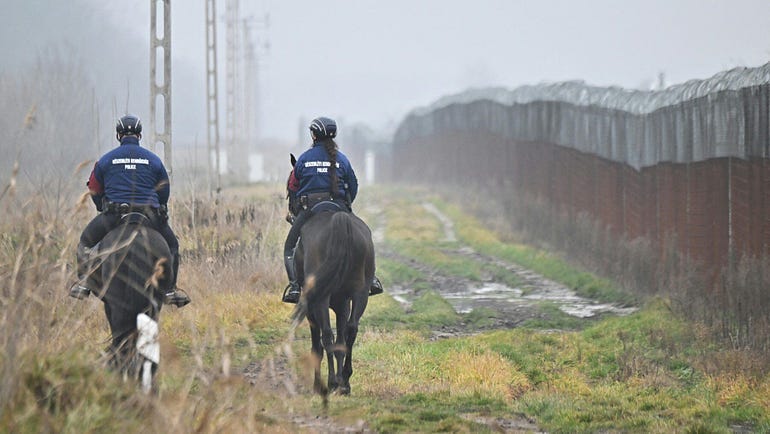
The Trump — Orbán Connection
Viktor Orbán’s idea of external “hotspots” for registering asylum seekers is directly related to Donald Trump’s oft-criticised policy of forcing would-be migrants to “Remain in Mexico” in order to process their paperwork outside the United States before being allowed into the country.
In fact, Orbán’s prediction that the EU will also eventually resort to his “external hotspot” policy is supported by the fact that the Biden Administration, which canceled Trump’s “Remain in Mexico” policy when they took office, has now been forced to reinstate the policy.
Trump and Orban — fellow populists and BFFs
It is no secret that the Hungarian Prime Minister is an enthusiastic supporter of Donald Trump, with whom he shares many views. These include a sceptical view of NATO as well as a preferred path of rapprochement rather than confrontation and provocation with Russia and President Vladimir Putin, a man whom the both admire.
Indeed,as mentioned above, one of Orbán’s first actions upon taking over the Presidency of the EU was to embark on a “peace mission” in which he not only visited Vladimir Putin but also flew to Mar-a-Lago to meet with Donald Trump — despite the fact that Trump was not a sitting President.
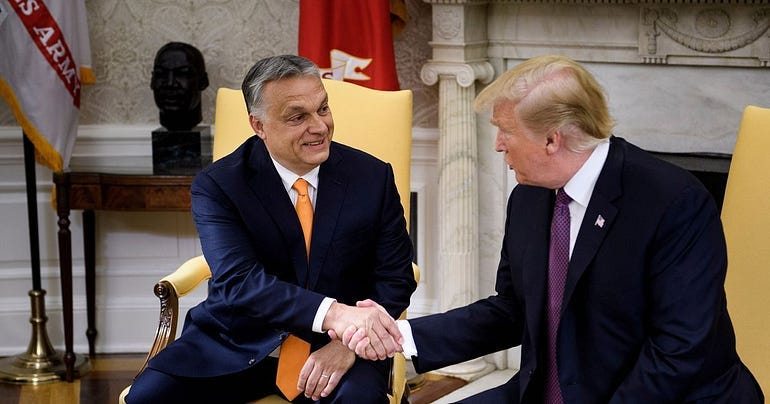
The Hungarian PM is quite open about his biased support for Trump in the upcoming IUS elections. In February, Orbán said:
“We can’t get involved in another country’s elections, but we would really like President Donald Trump to return to the presidency and make peace here in the eastern half of Europe.”
When Orbán went to Strasburg this month, he told reporters that he would “open several bottles of champagne” if Trump is returned to power.
Trump, Orbán — and Bernie Sanders?
The combined media freak-out over the Trump-Orbán meeting — as well as the underlying friendship itself — is to me highly indicative of the global elitist campaign against populism in general and the elevation of national interests and working class values over those of the globalists.
This stark contrast hits me personally. I myself am a product of the Left — I am a socialist and was an avid supporter of Bernie Sanders in both the 2016 and 2020 election. Although I would never have voted for Trump, and instead joined the Green Party USA, there was a real connection that Trump had with many blue collar Bernie voters, a large number of which went on to vote for Trump in the general election.
In fact, according to Vox, the Bernie voters may have delivered Trump his victory in 2016:
“In several key states — Pennsylvania, Wisconsin, and Michigan — the number of Sanders to Trump defectors were greater than Trump’s margin of victory”
So the Trump-Sanders connection is and was significant — perhaps even decisive. Nonetheless, it is a phenomenon that is deliberately overlooked by the mainstream media because it does not fit their anti-Trump narrative, which portrays Trump as a far right-wing “authoritarian” who likes other “strongmen” — a far cry from the modest yet unabashedly socialist Sanders.
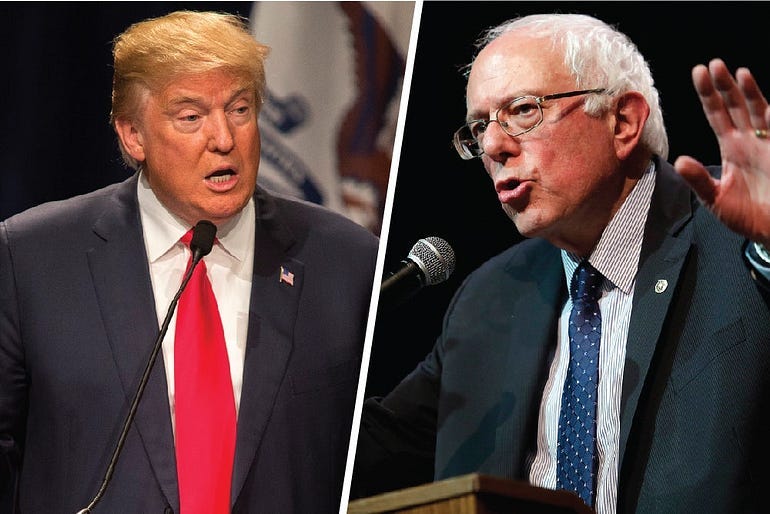
And yet, the liberal warhawk and inveterate neocon Jonathan Chait, writing in New York Magazine, sought to explain the outrage at the Trump-Orbán meeting as follows:
“Imagine if President Bernie Sanders invited the left-wing Nicolás Maduro to the White House after previous administrations had shunned the Venezuelan strongman. Imagine Sanders then praised Maduro, not only as an ally to the United States but as a wise ruler, and compared Maduro to himself. Then you might begin to understand the chilling message delivered by President Trump through his friendly meeting with Hungarian president Viktor Orbán.”
What utter, complete poppycock. It is almost laughable that a professional journalist would think that such a framing could actually serve to convince anyone to condemn Trump for meeting with Orbán.
Forget the fact that Hungary, unlike Venezuela, is an actual NATO ALLY of the US. Forget the fact that Hungary is still a member of the EU, another American ally, and that Orbán himself is the PRESIDENT of that Union.
Chait’s ridiculous analogy only served to further convince me — a fan of BOTH Sanders and Maduro — that I should reconsider the whole Trump-Orbán alliance and what it ACTUALLY stands for — and NOT what globalist warmongers like Chait say it is.
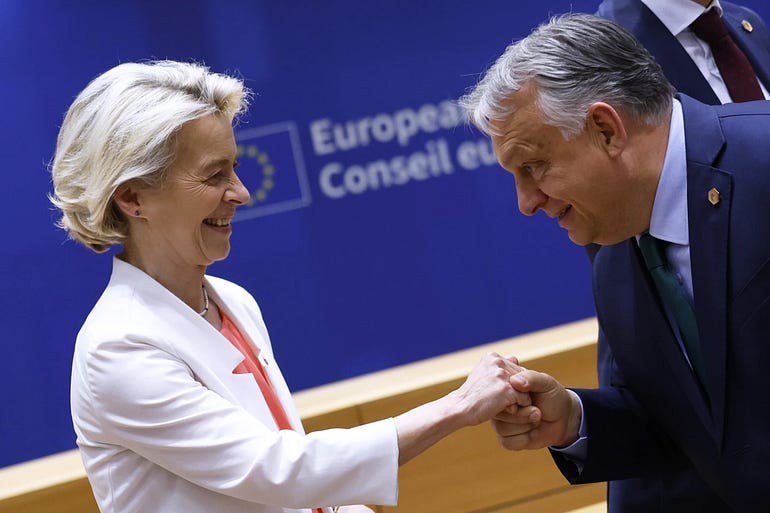
Orbán and MEGA — “Make Europe Great Again”
At the heart of the battle between Hungary and Brussels is what the Germans call a “Denkfehler”. The liberals in the EU attack Hungary and Viktor Orbán as being “anti-Europe”, of failing to uphold “European values” and in general being against the European Union itself.
And yet, Orbán is not proposing that Hungary leave the EU. There is no talk of a “Hexit”. In fact, Orbán credibly professes a love and respect for the European Union and its promise.
In 2018, Stefano Bottoni, a senior fellow at the Hungarian Academy of Sciences, said that Orbán, having secured his position in Hungary, wanted to play on a larger stage.
“He wants to represent and give voice to a sovereign Europe, a European Union of nation-states,” Mr. Bottoni said.
This year, during his address to the European Parliament in Strasburg, Orbán made clear what his intentions are: to foster “change” in the European Union, and to bring the institution back to its original precepts of “Unity in Diversity”.
In his speech before the plenary session of the European Parliament, he declared:
“Our Union must change. Hungary is here to be the voice of that change and to be a catalyst of it. We Hungarians are part of the European Union not for what it is, but for what it could be”.
He continued:
“As long as we see even the slightest chance to help Europe become what it can be, we will continue to fight for it. Our presidency’s success will be the Union’s success. Let’s make Europe great again.”
In short, the Hungarians — as well as their conservative allies in other EU countries — are not seeking radical changes to the European experiment, but rather they want to bring the EU back to its original mission.
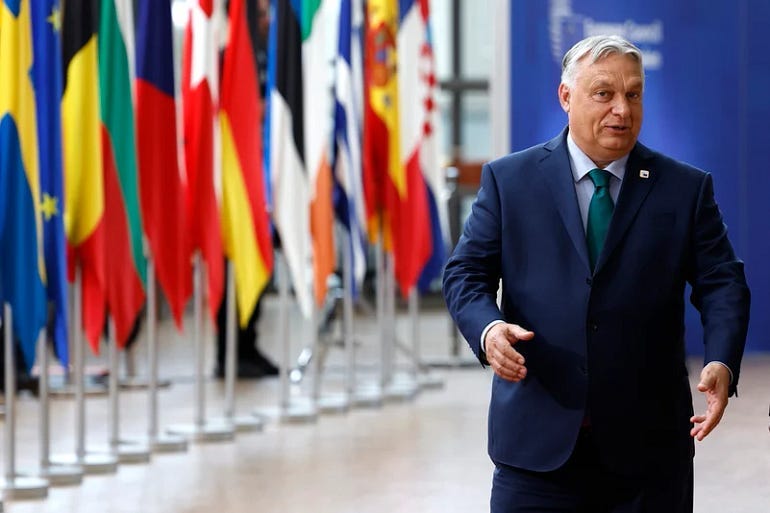
This is why Hungary has adopted as the motto and slogan of its EU Presidency the exhortation to “MAKE EUROPE GREAT AGAIN” (MEGA).
This is, of course, a not-so-subtle nod to Orbán’s fellow traveller, Donald Trump, who has promised to “Make America Great Again” (MAGA).
Hungary’s EU Affairs Minister János Bóka outlined Budapest’s program and ambitions for its six months at the helm of the world’s biggest trading bloc, starting on July 1.
“This is a reference to an active presidency…It actually shows manifest the expectation that together we should be stronger than individually, but that we should be allowed to remain who we are when we come together,” he told reporters.
Whether MAGA or MEGA, the goal is the same: to fight against woke culture and the global elitist campaign to eradicate borders, suppress national pride, erase national identity, history and culture, and replace it with a globalist agenda in which the entire world is one homogenous mass that can be easily led, manipulated and dominated.
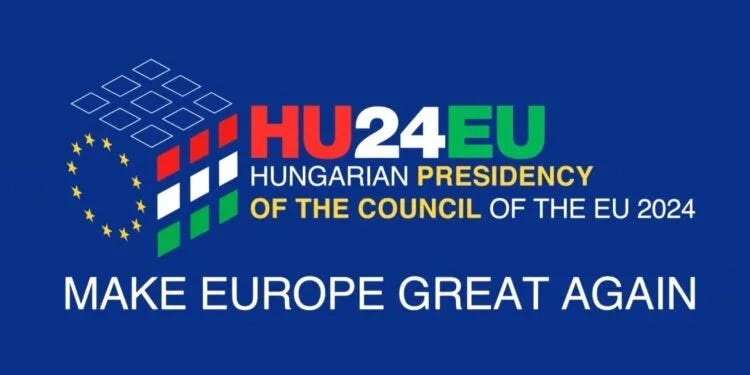
The one adult in the room
Rodrigo Ballester, a Spaniard who is the Head of the Center for European Studies at the Mathias Corvinus Collegium in Budapest, wrote an opinion piece that correctly summed up the battle waged between Viktor Orbn and the European Union, calling out the EU members for their petulance and immaturity:
“European leaders show the faults one would attribute to a capricious child, so indicative of the “woke state of mind” among the elites, which is plunging Europe into a despairing morass of incompetence.”
Bellester concluded with praise of Orbán:
“Alone against all, armed with democratic legitimacy and clarity of vision, the Hungarian dominated the European Parliament…he demonstrated, over the course of three hours, that among the spoiled children, there was only one adult in the room.”
Viktor Orbán does indeed seem to be the only competent voice in Brussels. Gone from the scene are true statesmen and seasoned politicians like Chirac, Schröder, Draghi and Merkel. In their place we have “clowns” like Starmer, Scholz, Macron and von der Leyen.
Among these incompetent fools, Viktor Orbán truly does stand out as “the only adult in the room”, and for that reason he is my hero.
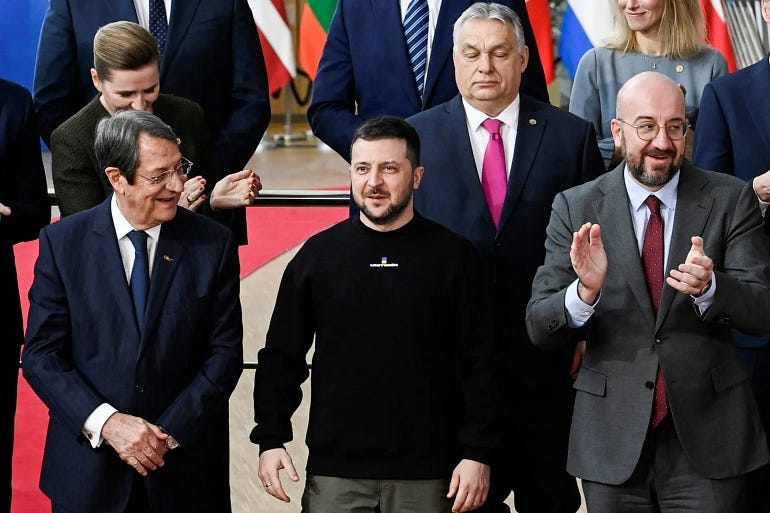
#End
If you liked this post, please consider leaving me a tip! Donations support my independent, ad-free writing.
===========================================================================










Can/should the EU Council & Commission, bodies not elected by a democratic process, rule over the national direction of the constituent nations whose leaders are democratically elected ? One would think not.
Both, Orban and VDL, are awful persons. With Hungary’s “explosive “ birth rate, I wonder who’ll support the elderly. Lots of wokeism in your article.